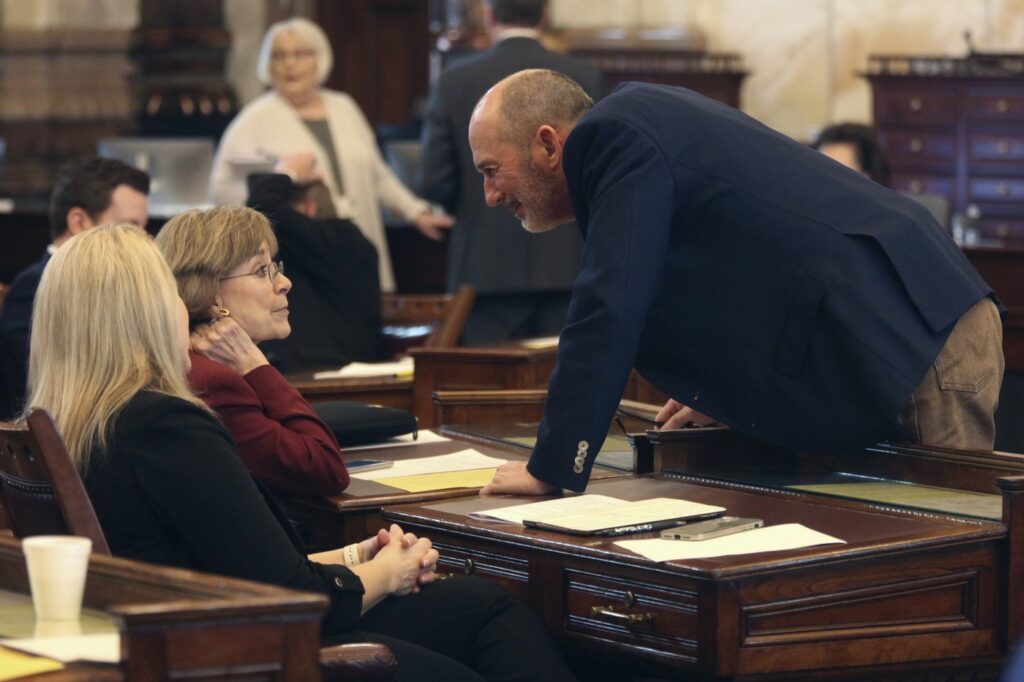

Global HR News
Compensation
Global HR News
Politics
Kansas lawmakers are allowing a 93% pay raise for themselves to take effect next year
February 8, 2024
By
The Associated Press
 Kansas state Sen. Mark Steffen, right, R-Hutchinson, confers with Sen. Beverly Gossage, R-Eudora, left, during the Senate's session, Wednesday, Feb. 7, 2024, at the Statehouse in Topeka, Kan. All three senators wanted to force a debate on a proposed 93% pay raise for legislators starting next year but that effort has failed, and the pay raise is set to take effect. (AP Photo/John Hanna)
Kansas state Sen. Mark Steffen, right, R-Hutchinson, confers with Sen. Beverly Gossage, R-Eudora, left, during the Senate's session, Wednesday, Feb. 7, 2024, at the Statehouse in Topeka, Kan. All three senators wanted to force a debate on a proposed 93% pay raise for legislators starting next year but that effort has failed, and the pay raise is set to take effect. (AP Photo/John Hanna) By John Hanna in Topeka
TOPEKA, Kan. (AP) — Kansas is set to nearly double state legislators’ pay at the start of next year, making their compensation better than it is for their counterparts in a majority of states, including more populous ones like Georgia and Texas.
The increase is nearly $28,000 a year for rank-and-file legislators, boosting their total compensation from $30,000 to nearly $58,000, an increase of 93%. Legislative leaders get additional payments because of their duties, and the House speaker and Senate president are set to make more than $85,000 a year, up from $44,000.
The pay increase appeared to have bipartisan support, though lawmakers never voted directly on it. Instead, they set up a bipartisan pay commission last year, with its proposal taking effect unless both legislative chambers passed a resolution rejecting it by Wednesday. An effort to force a debate in the Senate failed last week, and there was no such move in the House.
Some Kansas legislators have complained for years that their annual compensation of $30,000 isn’t enough to live on year-round, while their duties as lawmakers cut into outside work or even prevent them from holding down other jobs. Supporters of the pay increase say it is likely to make the Legislature more diverse when it’s in danger of becoming mostly retirees and wealthy people.
“You might get a few more females,” said state Sen. Cindy Holscher, a Kansas City-area Democrat. “You might get a few more minorities. You might get a few more younger people.”
Alaska lawmakers’ salaries rose by 67% at the start of this year, from $50,400 to $84,000, also because legislators let a proposal from a pay commission stand. New Jersey legislators will see their pay increase in 2026, also by 67%, from $49,000 to $82,000. New York lawmakers received a 29% raise at the start of 2023, making their pay the highest in the nation at $142,000 a year.
Most states pay a salary and give their lawmakers extra money each day to cover expenses in session, according to National Conference of State Legislatures data. New Hampshire’s salary is $100 a year — the same as it was in 1889, while New Mexico pays $202 to cover lawmakers’ expenses in session but no salary.
When Kansas became a state in 1861, its constitution said lawmakers were to receive $3 a day in session, up to $150. They didn’t get a raise for nearly 90 years, with voters rejecting five proposals before approving pay of $12 a day in 1948. In 1962, voters said lawmakers’ pay could be set by state law.
The new figure, nearly $58,000, includes both a salary and daily, in-session payments to cover expenses such as meals and housing.
“I think it’s fair,” said House Speaker Dan Hawkins, a Wichita Republican. “I think that the commission did, really, a pretty good job.”
Commission members argued that their sizeable pay increase represented catching lawmakers’ compensation up to several decades’ worth of inflation. However, the proposal did draw at least a few objections.
Sen. Rob Olson, a conservative Kansas City-area Republican, tried and failed last week to pull an anti-pay raise resolution out of the Senate budget committee so senators could debate it on the floor. The effort fell short because a dozen of the 40 senators passed.
Senate President Ty Masterson, a Wichita-area Republican, saw opposition to the pay raise as political grandstanding.
“It’s just kind of political theater,” he said after last week’s vote.
The Senate budget committee did review the pay proposal Tuesday during a short hearing. Nicholas Reinecker, a central Kansas restaurant owner who makes seven to 10 trips to Topeka a year to advocate for legalizing cannabis, had to interrupt the its adjournment — after no action — to get his opposition on record.
He said he wants Kansas to keep its “citizen” Legislature, adding that when lawmakers take their oaths of office, they promise to “sacrifice for God, family and country.”
“I’m sorry, it’s not supposed to be a job,” he told the committee, predicting that the big pay raise could lead to “entanglements” with professional lobbyists.
Olson said he doubts lawmakers’ constituents support such a big pay raise and said they should have the courage to debate it and vote on it.
And Rep. Ken Corbet, a Topeka Republican who operates a hunting lodge, said that in most businesses, the boss sets the pay, not the employees. And his boss — the taxpayers — haven’t told him a pay raise is OK with them, he said.
He had considered proposing his own anti-raise resolution, but, “Apparently, there was not an appetite for that.”
___
Associated Press writer Becky Bohrer in Juneau, Alaska, contributed to this report.
Print this page